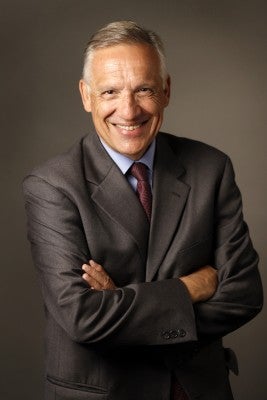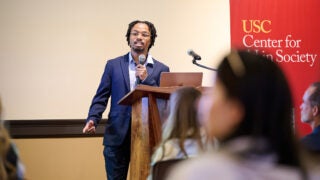USC Viterbi dean talks diversity from the White House
Yannis Yortsos reflects on his school’s efforts to drive diversity in engineering
Demo Day at the White House showcased the wide-ranging talents of innovators from across the country on Aug. 4. Unlike a private-sector Demo Day, where entrepreneurs “pitch” their ideas to funders, innovators from around the country joined President Barack Obama to “demo” their individual success stories and show why we need to give every American the opportunity to pursue their bold, game-changing ideas.
USC Viterbi School of Engineering Dean Yannis C. Yortsos talks about his appearance at the White House that day.
Why were you at the White House this week?
As chair of the Diversity Committee of the Engineering Deans Council, I led the Engineering Diversity effort, which has resulted into a letter pledge signed by more than 100 engineering deans in a very short period of time — less than two weeks since the campaign was launched. The White House Office of Science and Technology Policy thought that it is a wonderful initiative, nicely complementing the first-ever White House Demo Day on inclusive entrepreneurship. We timed the joint announcement of the two events, and as a result, I was invited as a guest at the event.
What has USC Viterbi been doing to foster diversity?

USC Viterbi has a number of significant efforts — from K-12 to undergraduate admissions to faculty recruitment — to enhance engineering diversity in all the parts of the engineering pipeline. I am particularly proud of the fact that fall 2015’s entering freshman class consists of approximately 38 percent women, when the national average is still below 20 percent. There is a lot more that we need to do, and we are making strides through coordinated efforts.
What excited you most about the White House event?
In the past, the career avenues of engineering graduates were either industry or graduate school. Today, more and more of our engineering graduates start or join technology startups. Entrepreneurship is thus becoming a significant career alternative. It is important that this avenue becomes available to a wide segment of our graduates and our society. [The Aug. 4] event is an affirmation at the highest level of authority in the U.S. — the White House — that this is indeed an important national priority.
How do you think this diversity initiative and commitment will impact society?
Changing the conversation about engineering is a necessity, even for growing the economy. By engaging our whole society in STEM (science, technology, engineering and mathematics), we increase our innovation capacity through the diversity of thought and ideas. It’s also timely — to break stereotypes about ability and talent. Today’s world is driven by intellectual property generation. Engineering is right in the middle of it; it empowers society. Our economy and ultimately our national security will be won on the strength of this competition. And we want all of our society to be equal partners in this evolution.



